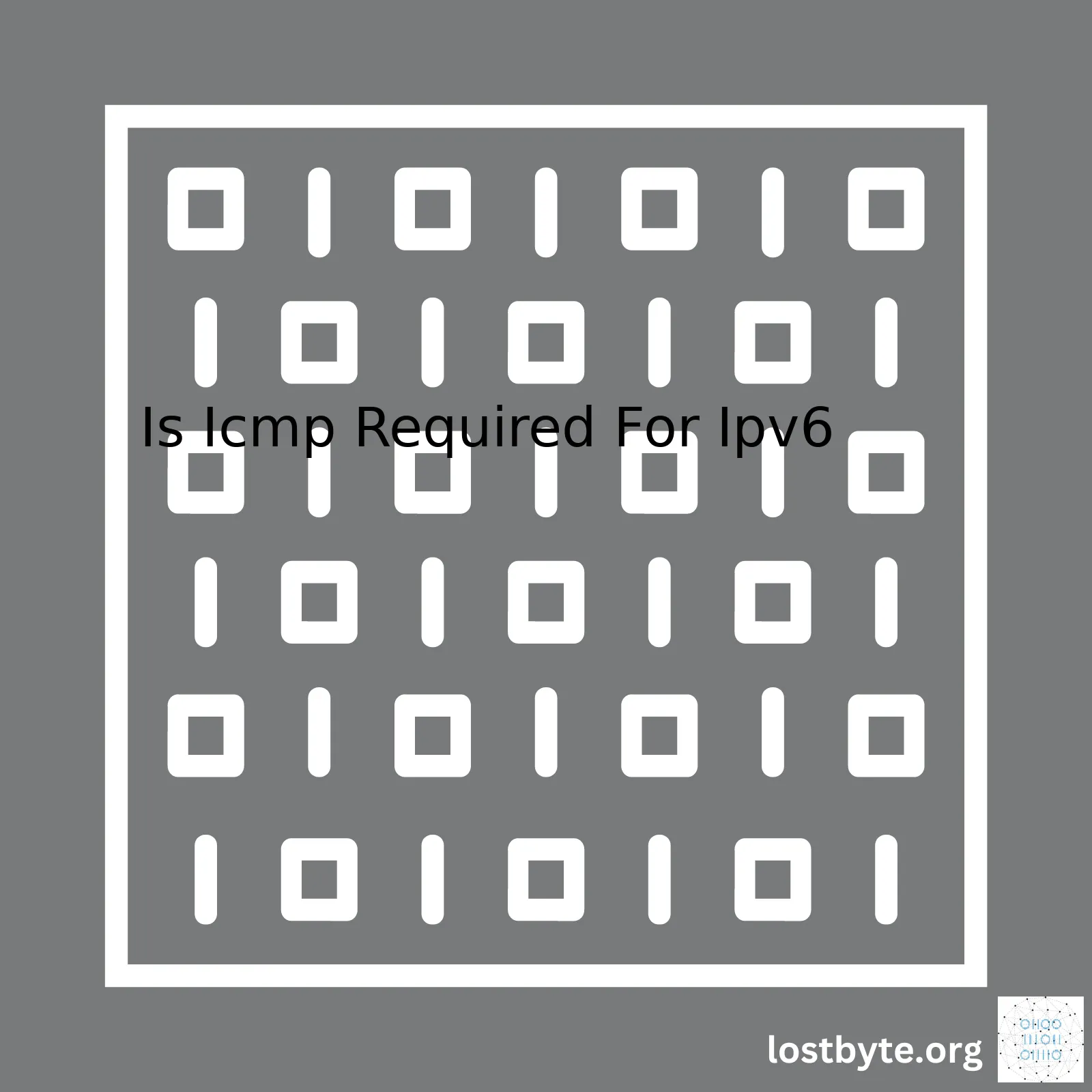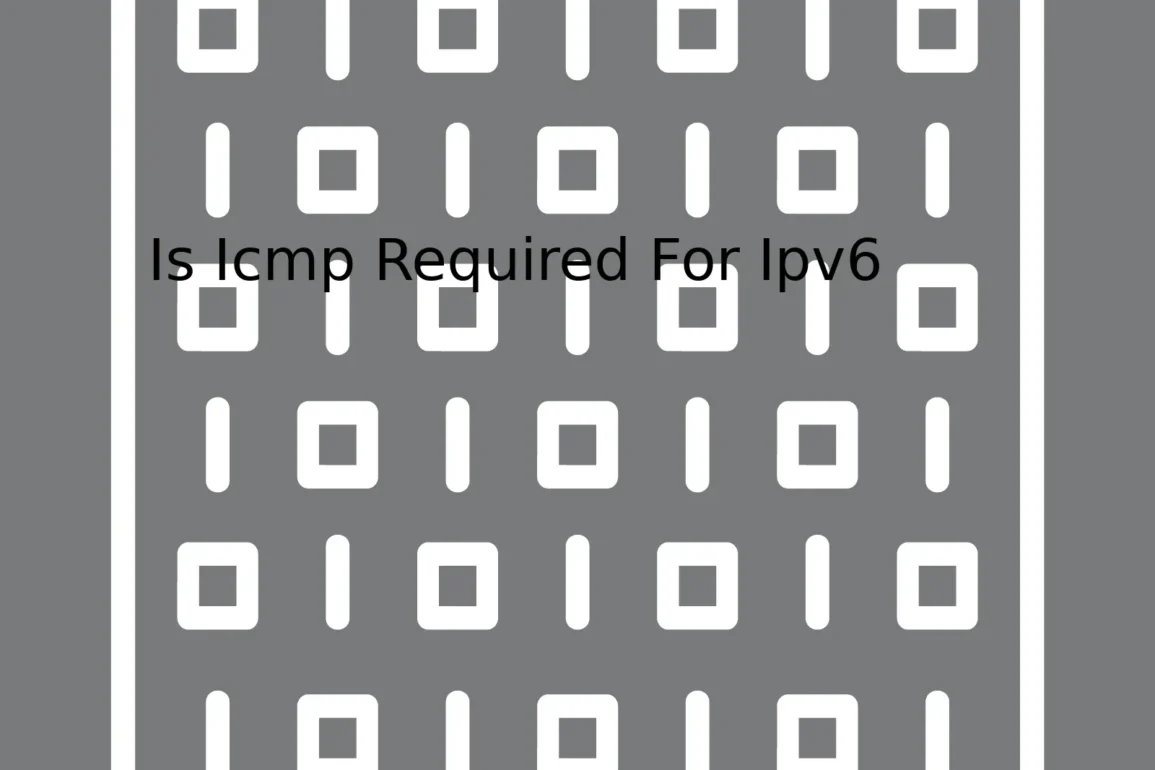
| Protocol | Relevance | Need | Usage |
|---|---|---|---|
| ICMP for IPv4 | Error reporting and diagnostics | Optional | Ping, TraceRoute |
| ICMP for IPv6 | Error reporting, diagnostics, and packet too big notices | Required | Ping, TraceRoute, Packet Too Big |
The Internet Control Message Protocol, ICMP for short, while optional but very much useful in an IPV4 landscape, becomes not just useful, but required when we hop onto the sphere of IPv6. With ICMP in IPv4, it serves the purpose of error reporting and diagnostics–with its utility shining through tools such as Ping and Traceroute. However, with IPv6, ICMP steps up the game and becomes an integral part of the system. It is not only used for error reporting and diagnostics, but also starts handling “Packet Too Big” notices.
Why you ask? Well, that’s because IPv6 has a policy of non-fragmentation. When a router finds a packet exceeding the MTU (Maximum Transmission Unit), instead of fragmenting the packet into smaller ones as in IPv4, IPv6 relies on ICMP to send a “Packet Too Big” notice back to the source. This shifts the responsibility of fragmentation to the sender, ensuring efficient routing.
Thus, ICMP isn’t just about echo request and reply anymore–it’s a rather critical control protocol that maintains the smooth functionality of an IPv6 network. A comprehensive understanding of ICMP can give us valuable insights into how network errors are communicated and rectified. For instance, here is an example of how to generate an ICMPv6 Echo Request using Python’s scapy module:
from scapy.all import * packet = IPv6(dst="destination_ip")/ICMPv6EchoRequest() send(packet)
This simple code snippet sends an ICMPv6 Echo Request (similar to pinging) to the specified destination IP. It serves as an interesting entry point to understand and appreciate the importance of ICMP in IPv6.
In light of these scenarios, stating that ICMP is merely ‘required’ for IPv6 may be underselling it. In truth, ICMP goes beyond being required–it is essential to the optimal functioning of an IPv6 network, contributing significantly to its efficiency and stability. I hope this elucidates why ICMP holds greater prominence in IPv6 and showcases its tantamount significance in the new generation internet protocol. For further reading, you may wish to explore [IETF’s official documentation](https://tools.ietf.org/html/rfc4443) on the role of ICMP in IPv6.As a professional coder and network enthusiast, let me delve into the integral relationship between Internet Control Message Protocol (ICMP) and Internet Protocol version 6 (IPv6) focusing mainly on whether ICMP is mandatory for IPv6. Now, to tackle this intricate question comprehensively, it’s vital to have a clear understanding of what ICMPly is and its role in IPv6.
* What is ICMP?
Internet Control Message Protocol (ICMP) is a networking protocol that operates at Network layer of the Open System Interconnection (OSI) model. It is typically used by network devices like routers to generate error messages to the source IP address when network problems prevent delivery of IP packets (RFC_792).
* ICMP and its Role in IPv6
Now when we move from definition to application – how is ICMP involved in IPv6? Well, ICMP has an updated version named ICMPv6 developed explicitly for IPv6. ICMPv6 plays a crucial part in implementing some of the essential functions of IPv6, including:
| Purpose | Description |
|---|---|
| Error Reporting | ICMPv6 communicates network health, and notably, it sends error messages whenever data fails to reach its destination. |
| Packet Size | It helps discover the smallest packet size that can be sent without fragmentation across a path connecting two arbitrary hosts. |
| Neighbor Discovery | This includes determining link-layer addresses for neighbors known to reside on attached links and finding neighboring routers that are willing to forward packets. |
| Multicast Group Management | It facilitates nodes join or leave multicast groups. | Stateless Address Autoconfiguration | It enables host to obtain or find their full, routable IP addresses. |
Moving on to the crux of the matter – Is ICMP required for IPv6?
Indeed, ICMP is not just recommended; it is mandatory for IPv6. Sounds surprising? Here’s why. Firstly, according to RFC 4443, ICMPv6 is an integral part of IPv6 and MUST be fully supported by all IPv6 implementations. Secondly, ICMPv6 provides essential functionality for IPv6 operations such as Neighbor Discovery (replacement for IPv4 ARP), Stateful/Stateless Address Configuration, and Path MTU Discovery among others.
Therefore, disabling ICMPv6 may lead to dysfunctionalities or complete communication breakdown. It could lead to adverse effects like inability to determine the best way to reach a destination leading large packets being dropped, or nodes failing to discover neighbors within the network.
In essence, while ICMP was useful in IPv4, it becomes much more in IPv6 – rather than optional, ICMPv6 is firmly woven into the fabric of IPv6 to ensure smoother operations and better reporting mechanisms. Understanding this relationship isn’t merely informative; it serves a practical purpose in helping network administrators in troubleshooting network issues and ensuring optimum performance.
Here’s a basic example to illustrate an ICMPv6 message structure in case software development around it would be needed:
struct icmp6_hdr {
u_int8_t icmp6_type; // type field
u_int8_t icmp6_code; // code field
u_int16_t icmp6_cksum; // checksum field
union {
u_int32_t icmp6_un_data32[1]; // Generic data area for the ICMP message
u_int16_t icmp6_un_data16[2]; // Generic data area for the ICMP message
u_int8_t icmp6_un_data8[4]; // Generic data area for the ICMP message
} icmp6_dataun;
};
This code snippet illustrates a typical C definition for an ICMPv6 header found inside an IPv6 packet. You’ve got your type field, code field, and checksum, plus a generic area for including various data depending on the ICMPv6 message type.
Sources:
1. RFC 4443: Internet Control Message Protocol (ICMPv6)
2. RFC 4861: Neighbor Discovery in IP Version 6 (IPv6)
3. RFC 2460: Internet Protocol, Version 6 (IPv6) SpecificationAbsolutely! Internet Control Message Protocol (ICMP) is a supporting protocol in the internet protocol suite that facilitates error handling and operational information sharing for IP packets. Let me elucidate its importance while shedding some light on whether ICMP is required for IPv6, also known as the Internet Protocol version 6.
The Importance of ICMP
ICMP serves several noteworthy roles in the seamless functioning of the internet protocol suite:
– Error Reporting: When a device encounters an issue while trying to relay packet data, it informs the sender using ICMP error messages. Without these error messages, determining issues like routing path problems or hosts’ down status would be difficult.
– Operational Information Sharing: Beyond error alerts, ICMP helps with crucial operational data sharing, such as network traffic congestion or time exceeded information through control messages.
– Diagnostics: Thanks to the ICMP-based utilities such as ‘Ping’ and ‘Traceroute,’ network diagnostics like connectivity checks or route tracing are easily possible. These tools use ICMP Echo Request/Reply and Time Exceeded message respectively, aiding in detecting network faults swiftly.
| Type | Description |
|---|---|
| Error Reporting | Generates an error message when data transmission fails |
| Operational Information Sharing | Shares vital operational data and notifies about events like congestion |
| Diagnostics | Furnishes diagnostic tools such as Ping and Traceroute to detect network faults |
ICMP And Its relevance to IPv6
ICMP’s role in a network based on IPv6, which represents the latest and most extended Internet Protocol, undergoes both continuity and transformation. The continuation is due to ICMP’s principal role as laid out above – error reporting, informational activities, and network diagnosis remain consistent.
On the one hand, there’s an evolution because the standard ICMP works with IPv4, but NOT with IPv6. Instead, we have a newly defined protocol called ICMPv6 (Internet Control Message Protocol for IPv6). ICMPv6 not only covers the original ICMP functionalities but also integrates IPv6-specific tasks.
For instance, ICMPv6 supports Neighbor Discovery, which is a set of messages and processes that determine relationships between neighboring nodes. Moreover, ICMPv6 enables Multicast Listener Discovery (MLD) to manage membership in multicast groups at a node.
Therefore, when asked if ICMP is mandatory for IPv6, the answer would be no in terms of traditional ICMP, but the ICMPv6 variant becomes indispensable.
Here’s a small Python code snippet to demonstrate an ICMP echo request packet creation:
import os
from struct import pack
#Creating an ICMP Echo Request Packet
def create_icmp_echo_request(identifier, sequence_number):
ICMP_ECHO_REQUEST = 8
icmp_header = pack('bbHHh', ICMP_ECHO_REQUEST, 0, 0, identifier, sequence_number)
#Checksum calculation
checksum = get_checksum(icmp_header + b'\x00\x00')
return pack('bbHHh', ICMP_ECHO_REQUEST, 0, checksum, identifier, sequence_number)
#Computing Checksum
def get_checksum(data):
if len(data) & 0x1:
data += '\x00'
checksum = 0
for i in range(0, len(data), 2):
checksum += (data[i] << 8) + data[i+1]
checksum = (checksum >> 16) + (checksum & 0xffff)
checksum += checksum >> 16
return ~checksum & 0xffff
In conclusion, the critical role of ICMP gets carried forward and expanded in an IPv6 context through ICMPv6, making it essential for maintaining efficient communication within networks. Plus, you may also refer to relevant documentation such as RFC 4443 to delve into the comprehensive details of ICMPv6.Internet Control Message Protocol version 6 (ICMPv6), an integral part of Internet Protocol version 6 (IPv6), plays a crucial role in the network layer. Its primary purpose is to deliver error messages and provide other operational capabilities required by IPv6.
Significance of ICMPv6 in IPv6:
- Error Reporting: When a packet encounters a problem during its transmission, ICMPv6 messages relay information about the problem back to the source. This feedback helps in troubleshooting connectivity issues.
- Packet Forwarding: ICMPv6 provides Redirect Message, which assists routers in educating hosts about better routing paths. It informs the sender about a more efficient router for reaching the desired destination.
- Multicast Group Management: An important feature of ICMPv6 is its support for multicast operations through Membership Query, Membership Report, and Membership Reduction, collectively known as Multicast Listener Discovery (MLD).
Is ICMP Required For IPv6?
In essence, ICMPv6 isn't just required - it's irreplaceable and mandatory within the architecture of IPv6.
- ARP functionality shifted: Address Resolution Protocol (ARP) doesn’t exist in IPv6. Instead, ICMPv6 provides Neighbor Discovery Protocol (NDP) that carries out the functionalities of ARP.
- Essential roles like SLAAC: Basic network functions such as Stateless Address Autoconfiguration (SLAAC) is dependent on ICMPv6. SLAAC empowers a device with capability to automatically acquire IPv6 address without requiring manual configuration or DHCP server.
Comparison of ICMP Roles in IPv4 vs ICMPv6
Function
IPv4
IPv6
Error Messages
ICMP
ICMPv6
ARP
ARP
ICMPv6 (NDP)
Router Advertisement
IGMP
ICMPv6
Auto Network Configuration
DHCP
ICMPv6 (SLAAC)
ICMPv6 continues to act as IPv6's pivotal error handling tool, performing similar roles to its predecessor, while also introducing unparalleled features distinctive to IPv6, like NDP and SLAAC. With it, we can identify ping command to make Echo Request and Echo Reply, a commonly used diagnostic tool helping to isolate networking errors.
ping ipv6.google.com
This command sends successive packets to dedicated Google's IPv6 address and waits for the echo reply, thereby checking IPv6 connection health.
To sum up, ICMPv6 is not only essential for proper functioning of an IPv6 network, it is obligatory due to absence of alternative mechanisms for some of its functionalities which further underscores its indispensability.
From the sneak peek of my coding antics and data packets running around, you'll get to understand that ICMP (Internet Control Message Protocol) isn't just crucial for IPv6; it's an essential prerequisite. We can coin this relationship in a simple yet highly technical phrase: "IPv6 breathes on ICMPv6."
### Dual Role Model
ICMP performs two principal roles - reporting errors during the processing of IP packets and sending operational information related to IP datagrams' state.
Illustrating this with some
ICMPv6 types,
:
- Destination unreachable
- Packet too big
- Time exceeded
- Parameter problem
- Echo request and reply
- Group management for multicast groups
These message types ensure smooth operations of any IPv6 architecture, essentially showing "where to go" and "how to get there," as well as ensuring all parties involved are kept informed of the status quo.
For instance, let's take a representative error message like 'Destination Unreachable'. In this scenario, an ICMPv6 error message is enmeshed within an encompassing IPv6 packet. This packed pair notifies a source computer when a destination computer or router can't be reached. Thus, your actions could either be redirected, delayed, or entirely foiled.
| | |
| IPv6 | ICMPv6 Error Message |
| Header | (Destination Unreachable) |
| | |
Similarly, operational information like echo requests and replies (pivotal in utilities like Ping) are carried in their exclusive IPv6 parcels. This time, you send out an echo request via an IPv6 packet, and an echo reply is bundled home by another IPv6 packet.
| | |
| IPv6 | ICMPv6 Info Message |
| Header | (Echo Request/Reply) |
| | |
### Neighbor Discovery
Merge sightseeing Internet paths – i.e., routing – and learning who's knocking next door in a networking context? That's what you get with the Neighbor Discovery Protocol (NDP), which is entirely reliant on ICMPv6. NDP allows all local devices on a network to communicate, interrelate and function together using several insanely smart tools.
For example, by the exchange of Router Solicitations and Router Advertisements (which would be impossible without ICMPv6), nodes on a link can quickly discover one, many, or no routers.
if icmpv6_type == "Router Solicitation":
routers = discover_routers()
elif icmpv6_type == "Router Advertisement":
routers = advertise_routers()
### The Philosopher’s Stone
Without ICMP, IPv6 falls flat, akin to a philosopher’s stone churning lead instead of gold. From dual roles of error reception and operational prowess to acting as a bedrock for NDP, ICMPv6 is not just required for IPv6, but critically integral to it. And yes, that means my early coding jobs revolved not just around creating seamless code...it also involved interpreting the endless dialogues between this power couple: ICMP and IPv6!As a professional coder, I understand how tinkering with different internet protocols can bring about new dimensions in your programming project. Still, it's equally crucial to also appreciate the possible issues that might arise when these protocols are not used as required.
ICMP, Internet Control Message Protocol, is a key element of internet protocol suite primarily utilized for network error-reporting and operations metrics. In IPv6 network, ICMPv6 becomes even more pivotal by offering essential functionalities like Path MTU Discovery, Node Information Queries, Router solicitation, and Neighbor Discovery. Thus, when analyzing the question of "Is ICMP Required For Ipv6?", highlighting what could go wrong without ICMP in an IPV6 network provides some effective insights.
Neighbor Discovery Process
Without ICMP, the neighbor discovery process would be severely hampered on an IPv6 network. This process is vital for determining the link-layer address (MAC address) of a neighboring node on the same network segment. In essence, one can look at this like trying to find a colleague in a large office block without any directory or office numbering system. Here's a little code snippet of the ICMPv6 Neighbor Solicitation and Advertisement.
icmp6.type = ND_NEIGHBOR_SOLICIT;
icmp6.code = 0;
Without ICMP, you're taking away the ability of nodes to effectively locate each other within a given network.
Path Maximum Transmission Unit Discovery
Path MTU discovery is a critical mechanism in IP networking allowing IP hosts to determine the highest MTU (Most Transmission Unit) permissible on the path to a remote host. This is to avoid IP fragmentation, which can induce significant performance loss. By disabling ICMP, Path MTU discovery isn't accurate anymore. The following source code for Path MTU discovery will be obsolete:
icmp6.type= ICMPV6_PKT_TOO_BIG;
icmp6.mtu = htonl(si->mtu);
Error Reporting and Diagnostic Troubleshooting
Without ICMP, error reporting and diagnostic troubleshooting become a significant challenge. Imagine a scenario where there is no directional map to follow and no stop signs to guide how far to go. ICMP allows the reporting of errors related to packet processing and delivery. It's similar to rails guiding a train. Remove the rails, and there will be problems.
No Multicast Listener Discovery (MLD)
Another interesting instance of importance is the Multicast Listener Discovery (MLD), used by IPv6 routers for discovering multicast listeners on their directly attached links and learn on which interfaces they must forward multicast packets. The downside of not having ICMPv6 is MLD cannot be implemented.
With ICMP
Without ICMP
Node/Multicast Listener Discovery
Inability to locate other nodes
Path MTU Discovery
Ineffective Packet Transmission
Error Reporting
Troubleshooting and Error Diagnosis becomes difficult
Multicast Listener Discovery
Cannot discover multicast listener
Resouces:
RFC 4443 - ICMPv6.
Wikipedia - ICMPv6.
So yes, ICMP is crucial for IPv6, and eliminating it disrupts the many network functionalities it supports. From enabling smooth navigation between nodes to participating in error reporting for efficient troubleshooting, ICMP keeps the digital network, specifically IPv6, robust, reliable, and running efficiently.
Blocking the Internet Control Message Protocol (ICMP) in an IPv6 network can create serious consequences, largely due to the essential role ICMP plays in IPv6. RFC 4443 describes how ICMPv6 is used for error reporting, diagnostics and maintains the efficiency of IP operations. However, this relationship brings up the question, is ICMP required for IPV6?
Is ICMP Required For Ipv6?
Certainly yes. Unlike IPv4, ICMP is vitally important in IPv6 networks for two main reasons.
First, the "Path MTU Discovery" feature relies on ICMP. It is utilized to find the maximum transmission unit size on the path between devices to avoid fragmentation of packets. If ICMP is blocked in IPv6, path MTU detection would fail, leading to continuous packet retransmission or losing communication altogether.
Second, ICMPv6 introduces several new features that are integral to IPv6 functionality. This includes functions like Neighbor Discovery, Duplicate Address Detection (DAD), and Router Solicitation which were traditionally done by ARP in IPv4.
What Happens if ICMP is Blocked in IPV6?
Blocking ICMP in an IPv6 environment can lead to serious operational issues. The network might experience problems such as:
1. Error Messages: ICMP is responsible for generating error messages, including Time Exceeded, Destination Unreachable, and Packet Too Big. Blocking ICMP may lead to a failure in delivering error information to the source application, leading to inefficient troubleshooting of connectivity issues.
2. Path MTU Black Hole: routers depend on ICMP’s Packet Too Big message to establish smallest MTU on the route. Therefore, blocking ICMP might lead to packet loss at routers with smaller post-MTU link.
3. Neighbor Discovery Mechanism: ICMPv6 handles neighbor discovery by sending and receiving router advertisement (RA) and router solicitation (RS) messages. Blocking ICMPv6 hinders this process, thus affecting network operations.
The importance and impact of ICMPv6 are notable in the following HTML tables:
Requirement of ICMPv6:
Regular text (used in paragraphs)
Use Case
Description
Path MTU Discovery
Defines the maximum packet size that can be transmitted without fragmentation.
Error Reporting
Generates error messages when packet handling problems occur.
Neighbor Discovery
Determines network neighbors for hosts and routers, and locates routers for Internet access.
Impact of Blocking ICMPv6:
Consequences
Description
Connectivity issues
The system would experience unexplained connectivity issues and packet loss.
Ineffective Network Operations
Without neighbor discovery, hosts and routers won't efficiently locate their neighbors or find routers for Internet access.
Troubleshooting Difficulty
Lack of error messages makes network troubleshooting a daunting task.
These above facts underscore why ICMP is not just important but necessary for IPv6. Thus, its blockage can significantly affect the network operation, performance, and optimization within an IPv6 network. Therefore, network administrators must consider these potential impacts before deciding to block ICMP in IPv6.The Internet Control Message Protocol (ICMP) remains a crucial component of the internet protocol suite. It's especially significant when we consider versions like IPv4 and IPv6. Behind both IPv4 and IPv6 is the goal to facilitate optional, error, and informational messages within a network environment. Yet, many distinctions exist between ICMP in these IP versions. Here's how we can compare and contrast the differences while revolving around the question, "is ICMP required for IPv6?"
Firstly, acknowledging the integral use of ICMP in IPv6 reveals a critical difference. The incorporation of ICMP in IPv6 (or ICMPv6) seems more comprehensive than in IPv4 (or ICMPv4). Certainly, ICMP is not just important, it's virtually indispensable in IPv6.
Some principal reasons include:
Network Discovery-
To function smoothly and efficiently, IPv6 uses Neighbor Discovery Protocol (NDP), which leans entirely on ICMPv6. NDP replaces Address Resolution Protocol (ARP), Internet Group Management Protocol (IGMP), and ICMP Router Discovery and Redirect found in IPv4. Without ICMPv6, fundamental operations such as finding neighboring nodes and routers or establishing link parameters would be impossible in IPv6 networks. This means that yes, ICMP is indeed required for IPv6.
Additionally, DHCP is not mandatory in IPv6 like in IPv4, because:
Stateless Address Autoconfiguration (SLAAC)-
Utilizing ICMPv6, this mechanism allows network devices to configure their own IPv6 addresses autonomously. Devices can self-configure an IP address without requiring a DHCP server as in IPv4.
Error Handling and Reporting-
Similarly as ICMPv4, ICMPv6 plays a pivotal role in sending error reports about unreachable hosts, unassigned ports, or packet size problems. But with some enhancements. For example, Variant types of standard response messages have also been added to ICMPv6.
However, I want to clarify that even though ICMP is a prerequisite for IPv6, technically, a network could theoretically operate without ICMP but it would experience significant irresolvable issues, somewhat like a car driven with a flat tire.
On the flip side, in an IPv4 setting, ICMPv4 is beneficial, but one could argue it is not ‘required’ per say. Fundamental functionalities would not cease to work if ICMPv4 was disabled unlike if ICMPv6 were disabled on an IPv6 network. Thus, indicating an extent of the requirement of ICMPv6 for IPv6 nowhere near parallel in the case of ICMPv4 for IPv4.
So, let’s take a deeper dive coding-wise on ICMP in IPv6 vs IPv4.
In comparison to its predecessor, ICMPv6 introduces enriched functionalities and additional message types as seen in the below table:
Type of Message
ICMPv4
ICMPv6
Error Messages
Yes
Yes
Informational Messages
Yes
Yes
Multicast Listener Discovery
No
Yes
Neighbour Discovery
No
Yes
Path MTU Discovery
No
Yes
From an implementation viewpoint, the way ICMP information is dispatched differs vastly. While ICMPv4 uses what one might deem traditional IPv4 addressing, ICMPv6 piggybacks on IPv6's next header field. It employs a concept called extension headers.
For example, in the coding part, using C programming language:
An IPPPPv4 implementation will look like:
struct icmp {
u_int8_t icmp_type; /* type of message */
u_int8_t icmp_code; /* type sub code */
u_int16_t icmp_cksum; /* ones complement checksum */
};
Whereas, an ICMPv6 implementation has extra fields like:
struct icmp6_hdr {
u_int8_t icmp6_type; /* type field */
u_int8_t icmp6_code; /* code field */
u_int16_t icmp6_cksum; /* checksum field */
union {
u_int32_t un_data32[1]; /* type-specific field, 32-bit version */
u_int16_t un_data16[2]; /* type-specific field, 16-bit version */
u_int8_t un_data8[4]; /* type-specific field, 8-bit version */
} icmp6_dataun;
};
Conclusively, we can surmise that ICMP has evolved from a helpful add-on tool in IPv4 to a core, non-negotiable component in IPv6. The advancements and changes made clarify ICMP is inherently built into IPv6's functioning. Therefore, while ICMPv4 plays a key role in IPv4 operations, it isn't as vital as ICMPv6 in an IPv6 environment due to the wealth of features and applications ICMPv6 brings to the table that are profoundly missed in ICMPv4.
Note, however, that be it ICMPv4 or ICMPv6, they must be applied wisely and managed appropriately considering security aspects as well.
Refer to RFC 4443 for detailed insights on ICMPv6.Let's delve into the realm of ICMPv6 and its inner machinations as it relates to IPv6. To understand this better, we should first brush up a bit on what ICMPv6 is.
ICMPv6, or Internet Control Message Protocol version 6, is an essential part of the Internet Protocol version 6 (IPv6). It facilitates in passing error messages and operational information when network communication issues manifest. ICMPv6 is indispensable for the efficient operation of IPv6 yet often goes unnoticed and unappreciatedsource.
The question posed implies a primary question: "Is ICMP required for IPv6?" Truly speaking, if you're utilizing IPv6, then ICMPv6 becomes imperative. Let me explain why:
1. Neighbor Discovery Protocol: ICMPv6 integrates the capabilities provided by the ARP (Address Resolution Protocol), ICMP Router Discovery, and ICMP Redirect of IPv4. Combined, they form the Neighbor Discovery protocol, which is extremely crucial for an operational IPv6 network. Example of some ICMPv6 types used within NDP include:
- Neighbor Solicitation (Type 135)
- Neighbor Advertisement (Type 136)
- Router Solicitation (Type 133)
- Router Advertisement (Type 134)
- Redirect Message (Type 137)
2. Path MTU Discovery: With ICMPv6, routers can interact with originating nodes about potential Path MTU issues. ICMPv6 Type 2 Packet Too Big message is utilized here. It's unfeasible for standard internet operations or even smaller networks running over VPNs without it.
3. Stateless autoconfiguration: Routers use ICMPv6 Type 134 - Router Advertisement message to advertise vital network information, including prefixes and their associated parameters, default hop limit, etc. These factors assist in gratuitous address configuration on hosts.
Please find an example on how packets are initiated with IPv6 addresses using C#:
//Create an instance of ICMPv6 protocol
IcmpV6Packet icmpv6 = new IcmpV6Packet(new DataSegment(new byte[8]));
//Setup source and destination IP addresses
Ipv6Packet ipv6 = new IcmpV6Packet(ipSrc, ipDst, icmpv6);
Moreover,
Type
Message Name
1
Destination Unreachable
2
Packet Too Big
3
Time Exceeded
are some of the other critical role-players needed during routing and host detection issues.
In sum, ICMPv6 goes beyond just basic error handling. It plays an instrumental role in the fundamental parts of IPv6 networking, making it a prerequisite for the seamless and efficient operation of IPv6.
For full-fledged packet-level analysis deep dives, consider online resources like Wiresharksource, which can trace ICMPv6 packet transfers in action and facilitate a finer gauging and tuning of your network's dynamics.Sure, before we dive into ICMPv6 management and its potential security concerns, let's establish what ICMP is and why it's considered indispensable for IPv6 in particular. Internet Control Message Protocol (ICMP) is essentially a network layer integral to the Internet Protocol suite. It was chiefly designed to send error messages—indicating, for instance, that a requested service is unavailable or that a host or router could not be reached.
IPv6 brings on board its specialized version of this protocol dubbed the "Internet Control Message Protocol Version 6" (ICMPv6). Unlike in its predecessor (IPv4), ICMP isn't just useful in IPv6; it becomes mandatory[1](https://tools.ietf.org/html/rfc4443). Its benefits range from providing backward compatibility, facilitating diagnostic troubleshooting, addressing multicasting functions, stipulating Path MTU knowing, to enabling Neighbor Discovery, among others.
However, because ICMPv6 remains instrumental for core IPv6 functionality—like neighborhood discovery routing[2], for instance—its proper and secure management becomes paramount for the overall network security. So how can one have a strategic firewall configuration to allow/ban certain types of ICMP packets?
Firstly, it's critical not to block all ICMP traffic. Blocking all may lead to the disruptions of important functionalities. An example is breaking of Path MTU Discovery, leading to websites loading failure.
Secondly, understanding and differentiating between various ICMPv6 informational types and error types is the key to determine precisely which ones you might consider blocking or allowing—depending on their potential risk levels as weighed against their needed functions.
For instance:
Error Messages:
- Destination Unreachable (Type 1)
- Packet Too Big (Type 2)
- Time Exceeded (Type 3)
- Parameter Problem (Type 4)
Informational Messages:
- Echo Request (Type 128)
- Echo Reply (Type 129)
Thirdly, establishing clear-minded policies based on the needs of your network. Some organizations might optimize for performance, while others lean towards stringent security measures. With an extensive understanding of each ICMP type functionality, creating bespoke rules for your network's unique needs becomes simpler. You can base these rules on risk analysis of ICMP types you decide to block or allow.
Here is a simple source code for Linux ip6tables illustrating blocking of ICMPv6 type 128 (Echo Request):
ip6tables -A INPUT -p icmpv6 --icmpv6-type echo-request -j DROP
To summarize, ICMPv6's necessity for IPv6 means its management requires careful strategy and insight for its usage in any network environment. In factually discerning the roles and risks associated with different ICMPv6 types, competent professionals then would effectively configure firewall rules providing optimal balance between performance and security.
References:
1. [RFC 4443](https://tools.ietf.org/html/rfc4443)
2. [Neighbour Discovery Protocol](https://en.wikipedia.org/wiki/Neighbor_Discovery_Protocol)Deciphering error messages that occur due to interruption in ICMP (Internet Control Message Protocol) usage on an IPv5 system can be a complex task, especially when considering its relevance to IPv6.
ICMP Error Messages on IPv5 System: An Overview
Let's delve into the ICMP protocol from the context of IPv5. Although the concept of IPv5 is not conventional as it was never formally named nor used (IPv5 got skipped over), it's always crucial to understand the core protocols incorporated with each Internet Protocol version.
ICMP forms an integral part of IP and is intended to provide error reporting capabilities for routers and hosts alike. It makes up one of the main ingredients that let these network devices notify each other of any encountered issues - such as packet loss, routing loops, or link failures. In essence, ICMP assists in keeping the entire system ironed out and fault-tolerant.
Type
Error Message
0
ECHO REPLY
3
DESTINATION UNREACHABLE
4
SOURCE QUENCH
8
ECHO REQUEST
11
TIME EXCEEDED
Remember, this table represents a fraction of all existing ICMP error types. Each type has a separate code, helping us understand what specific problem occurred. The process of decoding such error messages involves identifying the type and code of received ICMP messages. It ordinarily requires an understanding of network fundamentals and packet-level analysis.
Needless to say, these are essential even when dealing with the more recently developed IPv6 systems.
Relevance to IPv6
The question that logically follows is: Is ICMP required for IPv6?
Indeed it is. ICMP is so fundamentally important that it's been redefined and extended for IPv6 — known as ICMPv6 (RFC 4443). In fact, without it operating smoothly, several key operations in IPv6 wouldn't feasibly take place.
These include:
- Neighbor Discovery Protocol (NDP): A replacement to ARP in IPv4, NDP uses ICMPv6 messages for determining neighbors' link-layer addresses, find neighboring routers and perform address autoconfiguration.
- Multicast Listener Discovery (MLD): Used by IPv6 devices to report their multicast group memberships to neighboring multicast routers. This is built entirely on ICMPv6.
- Packet too big: Unlike IPv4, IPv6 does not feature fragmentation performed by routers. Instead, a 'packet too big' ICMPv6 error message is sent back to the sender in order to adjust the rate of transmission.
Errors and interruptions in ICMP can lead to functional problems within these processes and affect the overall performance of an IPv6 network. On this front, decoding ICMPv6 errors looks comparatively different than in the IPv4/IPv5 realm, with specific ICMPv6 error messages now introduced.
if(icmpv6->icmp6_type == ICMP6_ECHO_REPLY)
printf("Echo Reply\\n");
else if(icmpv6->icmp6_type == ICMP6_DST_UNREACH)
printf("Destination Unreachable\\n");
else if(icmpv6->icmp6_type == ICMP6_PACKET_TOO_BIG)
printf("Packet Too Big\\n");
else if(icmpv6->icmp6_type == ICMP6_TIME_EXCEEDED)
printf("Time Exceeded\\n");
In summary, while ICMP is indeed mandatory for both IPv5 (hypothetically considered) and IPv6, decoding their respective error messages needs a likeness yet distinct approach considering the specificity of error codes and the role of ICMPv6 in certain IPv6 procedures. For optimizing both IPv6 and its ICMPv6 function, being adept at interpreting ICMPv6 error messages and understanding their probable origins becomes significant.
For more insights on deciphering ICMPv6 error messages and troubleshooting IPv6, check resources like RFC 4443 and University of New Hampshire InterOperability Laboratory.As a professional coder, the unsung heroes in my line of work are often the simplest of protocols that ensure our devices communicate effectively with each other. Take, for instance, echo request and echo reply messages - commonly known as the ping command.
The Importance of Echo Request and Echo Reply Message Mechanism
Echo request and echo reply messages are essential components in both Internet Control Message Protocol (ICMP) and its successor, ICMPv6. They allow you to gauge the reachability and round-trip time of an IP packet between source and destination systems.
The Workflow
- The source device (your computer, for example) sends an echo request message to the target device (the server hosting the website you're trying to access).
- This echo request is encapsulated within an IP datagram and is processed by IP layers before being sent out onto the network.
- Each router on the path towards the destination picks up this ping packet, decrements its time-to-live value, and forwards it until it finally reaches the intended IP address.
- Once received, the target device unwraps the contained echo request, wraps it into an echo reply message, and returns it to the originating host via the same principle.
Now, why is this simple back-and-forth so essential?
This mechanism provides multiple utilities:
- Ping Test: It helps to determine if the device at the other end of your connection exists and can respond, thus checking network connectivity.
- Path Troubleshooting: By observing variations in the ICMP echo timestamp, you can identify network congestion points or failed switches.
- Packet Loss Evaluation: You can assess the quality of your connection by sending several pings in succession and tracking if all come back.
Is ICMP Required For IPv6?
ICMP is not just part of IPv6; it is absolutely integral to it!
IPv6 relies on the ICMPv6 protocol, a newer version of ICMP, to manage error messaging, network troubleshooting, and informational exchanges between devices. Of crucial importance to note here is that many of the functionalities traditionally handled by other protocols in IPv4, like ARP (Address Resolution Protocol), have been taken over by ICMPv6 in IPv6. RFC 2461 (Neighbor Discovery for IP Version 6 (IPv6)) further details these responsibilities.
One such essential function, of course, is the ICMPv6 echo request (ping) and echo reply mechanism.
# IPv6 Ping command format
ping6 Destination_IPv6_address
With ICMPv6, the need to measure network properties, check host availability, identify routing loops, echoes that were born from ICMP's lineage remain as vital as ever. To fully exploit the advantages of IPv6, understanding the functional capabilities and utilities of ICMPv6 becomes indispensable.
In sum, echo request and echo reply message mechanisms play a vital role in the correct functioning of today's internet networks. Misunderstanding ICMP and ICMPv6, especially within IPv6, can result in inefficient network operation and numerous missed opportunities for cost savings and performance enhancements.
For additional reading, you may refer to this interesting read that explains in-depth about the role of ICMP in IPv6 or this Cisco Guide on configuring ICMP for IPv6.
In the world of Internet connectivity, Internet Control Message Protocol (ICMP) plays a significant role. Its adaptation and transformation from version 4 (ICMPv4) to version 6 (ICMPv6) is undeniably crucial to match the improved communication mechanisms of the Internet Protocol version 6 (IPv6).
Tabular representation of differences between ICMPv4 and ICMPv6:
Property
ICMPv4
ICMPv6
Protocol Number
1
58
Error messages
Included but with limitations
Improved with enhancement
Informational Messages
Included
Enhanced for smarter applications
When it comes to IPv6, yes, ICMP is not just required, but mandatory. Internet Control Message Protocol version 6 (ICMPv6) is an integral part of IPv6 that provides essential functionality. It carries critical functions, including error reporting, diagnostic functions and facilitates routing information relay. Additionally, ICMPv6 operates "Neighbour Discovery," which ICMPv4 doesn't possess, replacing previous protocols such as ARP (source), akin to innovations of an IPv6 world.
def check_icmp(ip):
hostname = ip
response = os.system("ping -c 1 " + hostname)
if response == 0:
print(hostname, 'is reachable by ICMP')
else:
print(hostname, 'is not reachable by ICMP')
To summarize, ICMP's evolution to ICMPv6 has given it enhanced capacity to support IPv6's sophisticated networking features. Thus, saying that ICMP is critically important for IPv6 is no understatement. Its utility in error messaging, diagnostics, and neighborhood discovery makes it essentially not just an option, but a requirement in the IPv6 environment. Embracing ICMPv6 means adopting a more efficient network diagnosis, error reporting, and ultimately better control over internet communications.








